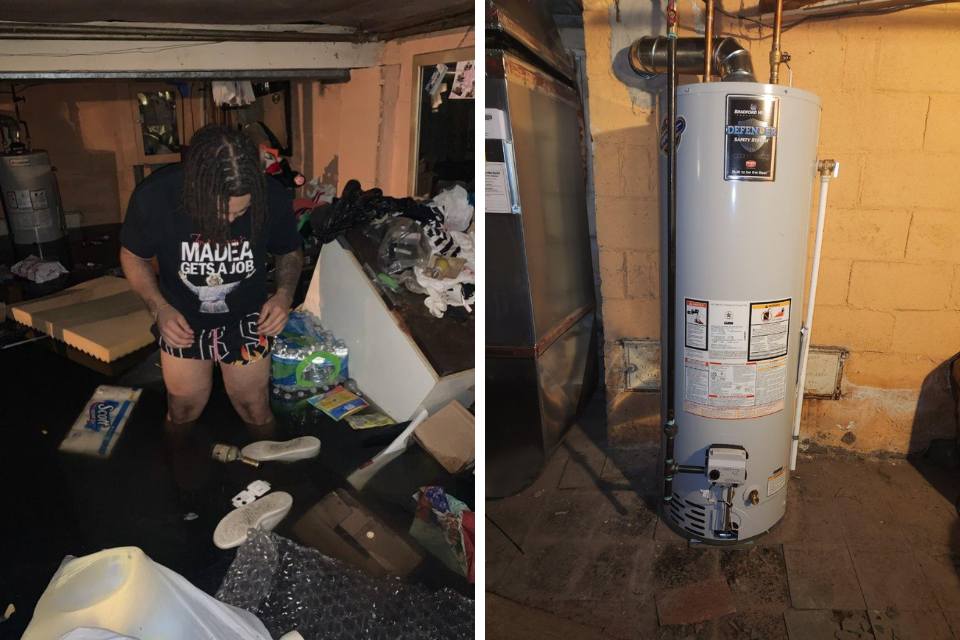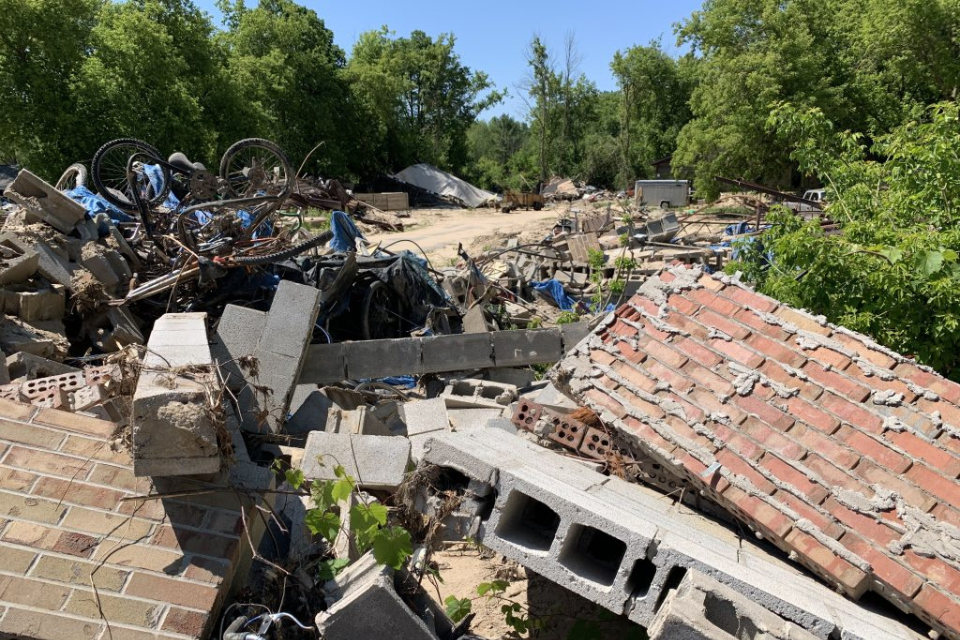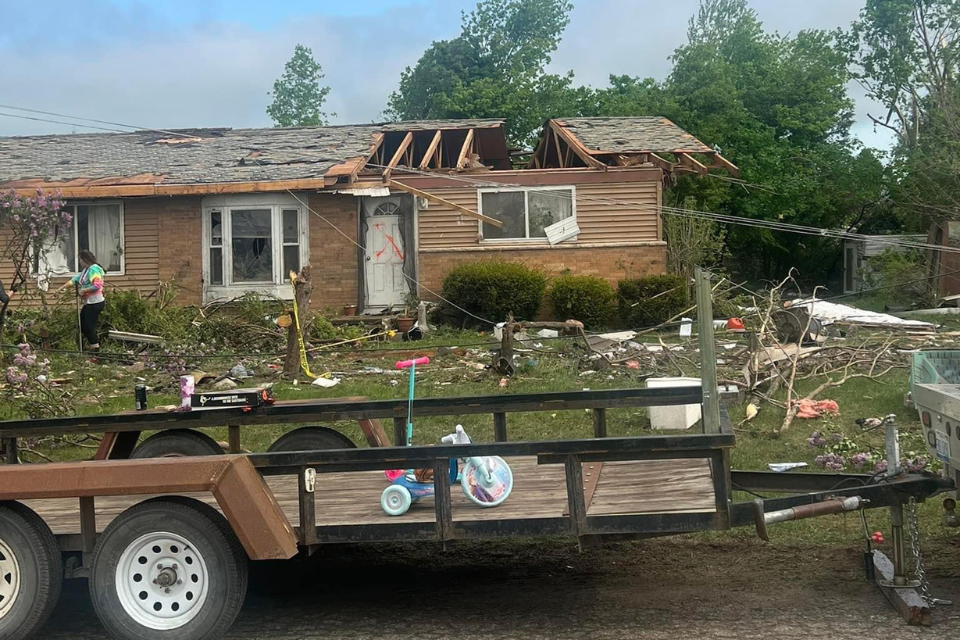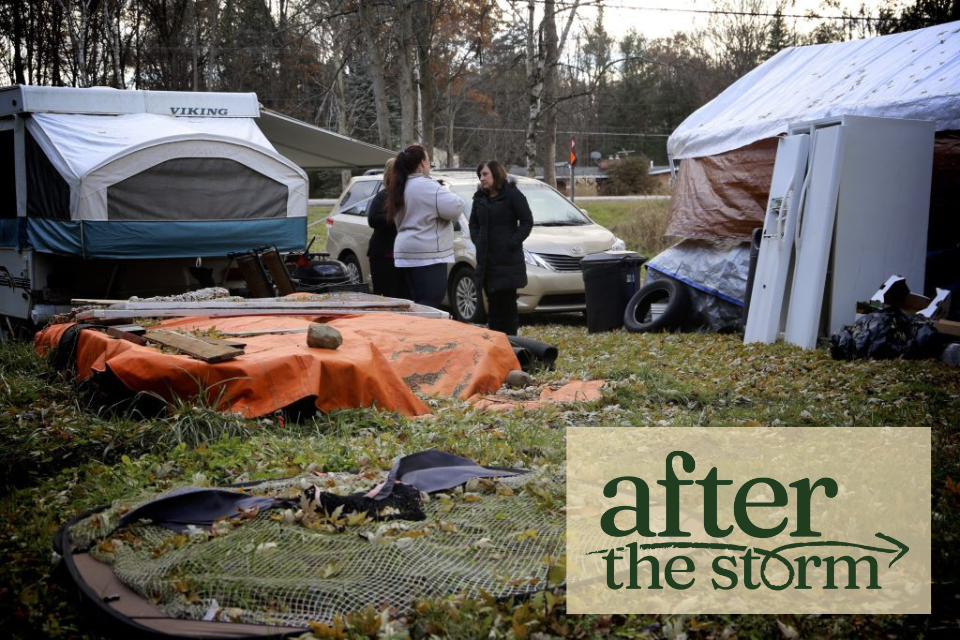With a new name and a new website, the Michigan Conference’s long-term disaster recovery nonprofit is better prepared to help Michigan rebuild one family at a time.
JAMES DEATON
Content Editor
Steven Farrar and his coworkers at After the Storm ring a bell in their office when some good news happens. Long-term disaster response and recovery can be discouraging work at times.
“Every time we get a resource for someone,” Farrar explains, “or every time a client gets approved to get some work done, or some work gets completed, we ring our bell. We let everyone know that in the midst of chaos, there’s still good happening.”
Farrar is part of After the Storm’s team that comes in once initial emergency responders are gone and walks alongside individuals and families as they come to terms with the damage and begin to rebuild their lives. After the Storm has quickly grown to be the expert in long-term disaster response and recovery here in Michigan, trusted by federal, state, and local partners.
What After the Storm does for Michiganders is really good news. Their mission is a big idea that United Methodists started right here in Michigan not that long ago. And now, with a fresh new name that speaks to their mission better and a brand-new website, they are poised for growth.
Last year, the Michigan Conference of The United Methodist Church officially launched After the Storm as an affiliated nonprofit since the work had outgrown the conference’s ability to manage. It was initially named Michigan Disaster Response and Recovery (MiDRR), but soon there was a need to have a friendlier name that would not be easily confused with a government agency. They also wanted a name that wasn’t hard to remember.
Leadership within the nonprofit worked with a marketing agency to come up with an assumed name that addressed these needs and aligned with who they are. After the Storm fit the bill.
Rev. Paul Perez, Director of Connectional Ministry for the Michigan Conference, also serves as chair of After the Storm’s board of directors. He believes the new name captures their mission in a simple and evocative way. He notes, “While many organizations are active in the days and weeks immediately following a disaster, After the Storm is present for months, and in some cases years, after a disaster accompanying survivors as they rebuild their homes and lives.”
For Nancy Money, Executive Director of After the Storm, the name change points to the storm not necessarily being just an external kind of storm. There’s also the internal storm—the chaos—that develops after a disaster strikes. The staff of After the Storm are trained to help with the physical aspects, but they also can address the emotional and spiritual sides as well.
Rev. Linda Stephan, Associate Pastor at Traverse City: Central UMC, is also on the After the Storm board, and sees a sense of warmth and hope in the new name, as it ties back to the biblical theme of the rainbow coming out after the flood waters recede. The new name also builds confidence in a survivor, who may wonder if this new organization that has reached out to them can be trusted. Stephan says it’s important to let survivors know who they are: “We’re Michigan people with a heart, and we really do want to help you.”

Neighbors caring for neighbors is at the heart of what has helped the Michigan Conference carve out a niche in Michigan’s disaster response and recovery network. After the Storm was birthed last year in response to widespread flooding in Metro Detroit and Southeast Michigan on June 25-26, 2021, that caused over $50 million in damage to homes and businesses throughout a multi-county region.
Because the Michigan Conference had become subject matter experts in disaster case management in other parts of the state—in the Great Lakes Bay Region, including a major dam breach in Midland, and the Houghton and Hancock areas in the Upper Peninsula—the Michigan State Police contacted After the Storm to see if they’d be interested in applying for a $15 million disaster case management program (DCMP) grant funded by FEMA to aid the extensive recovery project in Metro Detroit and Southeast Michigan.
A DCMP grant is where the Michigan State Police and the Federal Government work together to get funding for case management to help survivors find resources and funding to pay for repairs or replacements in the aftermath of a disaster. DCMP funding is strictly for staffing case management and the needs that go along with it (office space, work supplies, etc.).
After the Storm was eventually named as the provider for this $15 millon grant, to manage the funds, but they are working closely with two veteran agencies to split up the caseload throughout the affected area: Society of St. Vincent de Paul and the Wayne Metro Community Action Agency. There are over 100,000 registrants on the FEMA survivor list that After the Storm and these partner agencies are working their way through.
After the Storm currently employs 18 people, with Nancy Money serving as Executive Director, out of an office on the West Side of Detroit, the geographic area the nonprofit is responsible for. The other two agencies cover the remaining areas in Southeast Michigan. Because of the nature of the work, After the Storm operates by a ramp-up, ramp-down philosophy. Once a disaster hits and recovery begins, temporary full-time staff are hired to manage the workload, but once the workload decreases and cases close, the number of staff is reduced.
The team includes outreach specialists who are the first point of contact. Their job is to call people on the FEMA list who successfully registered for disaster assistance. They gather key pieces of the story and then ask if they would like to have a case manager call them to schedule a home visit to assess the damage and take next steps.

The heart and soul of After the Storm’s work is disaster case management, helping survivors put together a doable recovery plan that survivors have a hand in creating. Case managers work closely with survivors and help them navigate the complexities of rebuilding their homes and lives. Based on their experience, After the Storm understands that there’s no one-size-fits-all solution. A disaster hits everyone differently, as noted on their new website.
Steven Farrar started out as a case manager and is now a supervisor. He understands the importance of building trust and forming a good relationship with disaster survivors and then letting them know what’s expected from both sides of the relationship. “We let them know every step of the way,” he says, “that this is their recovery. We want them to own their recovery, and we just want to be there to assist along the way.”
Case managers work closely with other After the Storm team members in the creation and implementation of a survivor’s disaster recovery plan. A construction analyst evaluates the project and determines what is flood-related damage, as is the case in Detroit, and what is deferred maintenance. The construction analyst then puts together a project list that includes materials and which contractors are needed to be hired to fix the damages.
Cheryl Tipton, After the Storm’s resource coordinator, also collaborates with the various case managers to help them find the resources needed to complete a project. She has been particularly resourceful in recent months working with DTE Energy as they have donated furnaces and hot water heaters to families that have lost theirs due to flooded basements.
Another important aspect of disaster case management is connecting survivors with funding resources that are out there to help them repair or rebuild their homes. Some of these funding sources are for older adults, some are based on a family’s current income, and some are for those with disabilities. Case managers also assist with helping survivors access other resources, whether that is a food bank or temporary housing or home furnishings.
When survivors are ineligible for certain funding sources or have unmet needs that are not covered, After the Storm staff can tap into special grant funding that they have access to. Thanks to a generous grant provided by the United Methodist Committee on Relief (UMCOR), After the Storm has given out over $300,000 to Michiganders in the Metro Detroit area to help with unmet needs following the devastating 2021 floods.

Katie Vokal started with After the Storm in disaster case management following the 2017 flood in Midland, not far from her home. After a couple of employment hops, she returned in July 2022 to assist with the DCMP in the Detroit area and to supervise After the Storm’s case management work in Gaylord, following the May 2022 tornado. That work is still continuing, with 52 of 65 cases closed and the remaining cases wrapping up soon. In Gaylord, After the Storm’s community partners have been the United Way and Otsego Community Foundation.
Vokel mentions that what gives her joy in her daily work is seeing the growth in her coworkers. She feels blessed to work with such wonderful people. Seeing colleagues expand their skills and do things they didn’t know they could is rewarding. She notes, “It’s that growth and that love of helping people. And it’s just so contagious. Your whole office feels it.”
She has also been amazed by her own growth, something she feels is part of her own journey. “If somebody would’ve told me, back in 2017, you’re going to be able to impact your state, I would’ve thought to myself: How in the world? I’m a stay-at-home mom. But I think that when you’re faithful, and you say, ‘God, I’m here, use me,’ he does. And he is always like, look out because I know you’re going to think smaller than what I have planned.”
The Michigan Conference has started a good thing, a big idea that has really taken off and grown, and Michigan United Methodists can keep it going by supporting it in several ways.
Visit their new website and celebrate the new name and their reenergized mission to be there for Michiganders in the days, weeks, and years after a disaster. Don’t forget to sign up to be added to their email list, to receive updates on ways to support this growing nonprofit that was made possible because of Michigan United Methodists taking risks to care for their neighbors in need.
Michigan United Methodists can also sign up to join a disaster response team, which is how After the Storm mobilizes volunteers to muck out basements and other necessary tasks following a disaster. Rev. Paul Perez agrees: “Michigan United Methodists can support the long-term work of disaster response and recovery by learning more through attending trainings when they are offered by our Michigan Conference’s disaster response team.”
A final request is for Michigan United Methodists to give financially on a regular basis to After the Storm. After the Storm is a newly formed nonprofit, and they are looking to become financially sustainable. Once the current FEMA grant for disaster case management in Metro Detroit ends, there will be a need to continue basic operations until the next disaster strikes. Giving regular tax-deductible donations is the best way to support their future mission.
Perez concludes, “Michigan United Methodists can support After the Storm by donating directly to the organization. In the future, following a disaster in Michigan, they can also donate to the Michigan Conference Disaster Response Fund. I would also encourage Michigan United Methodists to give to UMCOR when there are disasters across the United States and around the world.”
Last Updated on March 14, 2023


